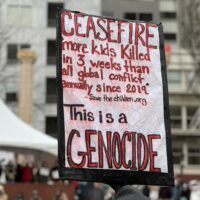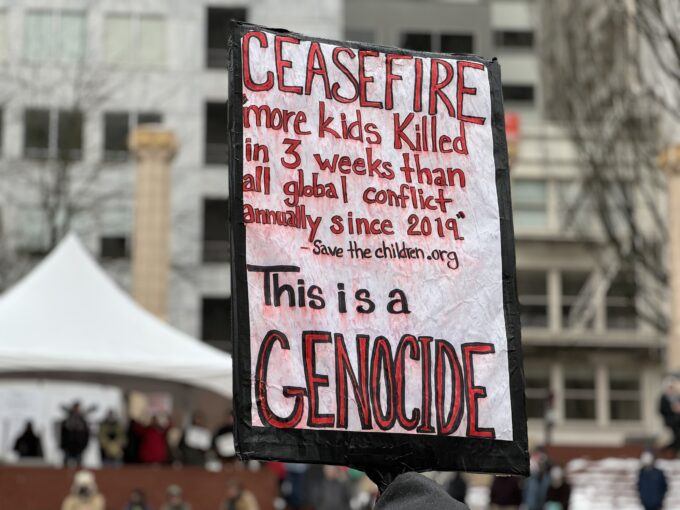

Photograph by Nathaniel St. Clair
“Am I doing the right thing?” parents ask. They make millions of decisions raising children with little official guidance. But a recent court decision in Michigan gave a resounding answer to Jennifer Crumbley. The court found that she was partially responsible for her 15-year-old son Ethan’s murderous rampage, determining she was guilty of four counts of involuntary manslaughter.
The court judged the mother accountable although she did not pull the trigger on the 9mm semi-automatic pistol the son used to murder four students and wound seven other people at a local high school. As the Gazan death toll approaches 30,000, and Israeli Prime Minister Benjamin Netanyahu prepares to bomb Rafah, we question whether those countries continuing to supply weapons to Israel are like the mother on a larger scale.
What had Mrs. Crumbley done or not done? The parents had bought the weapon for him. They had taken the 15-year-old boy to a firing range. The day of the school shooting the parents had been called to the school after a teacher had found a violent drawing and message on Ethan’s desk. The parents ignored strong signals that their son was potentially dangerous. The involuntary manslaughter charges were based on the mother’s failure to secure the gun Ethan used.
The notion of responsibility is never simple. The International Law Commission (ILC) considered Articles on Responsibility of States for Internationally Wrongful Acts between 1955 and 2001. No binding conventions or treaties resulted from the proposed articles. The Commission was unable to establish obligatory arbitration between states, to agree on penalties for international crimes, or to establish any formal legal structure with which to oversee legal state responsibility.
What makes the Michigan case so intriguing is the relationship between the final act by the son and the parents’ actions prior to the shootings. The German jurist Hans Kelsen examined the relationship between the consequences of an act and what preceded the act by imputation. Kelsen’s argument was that imputation is beyond simple cause and effect. We know the boy caused four deaths and seven injured persons. Imputation seeks to determine the responsibility for how the actor came to commit the act. In this case, the mother did not commit the murders, but she was determined to be partially responsible.
Can we use the idea of indirect parental responsibility for the action of a son to states’ indirect responsibility for providing weapons to Israel’s committing what the International Court of Justice (ICJ) officially ruled was “plausible” genocide? Can we impute responsibility for the 28,000 Gazan deaths to those countries which have supplied military material to Israel? If Mrs. Crumbley was guilty of not securing the gun, what about those countries which have not controlled the use of the weapons they sold to Israel?
Article III of the Geneva Convention on the Prevention and Punishment of the Crime of Genocide states that: “The following acts shall be punishable: (a) Genocide; (b) Conspiracy to commit genocide; (c) Direct and public incitement to commit genocide; (d) Attempt to commit genocide; (e) Complicity in genocide.” The Convention entered into force in 1951. As of January 2024, 153 countries have ratified the Convention, including Israel.
What does complicity mean for the United States? Although the United States signed the Convention in 1948, it was only forty years later, in 1988, that the Senate finally ratified the Convention. In addition to the Senate ratification, it also passed the Proxmire Act. The Act fully committed the U.S. to implementing the Convention.
Three Canadian scholars wrote in The Conversation the implications for Canada of the recent ICJ decision and Article III section (e) of the Convention:
“In 2022, Canada sent more than $21 million worth of military exports to Israel. The Export and Import Permits Act forbids arms permits to be issued if there’s a “substantial risk” that the goods could be used to commit or facilitate serious violations of international humanitarian or human rights law. Because the ICJ found a serious risk of genocide in Gaza, continuing to export arms to Israel would be illegal. It would also be flagrantly inconsistent with Canada’s obligation to prevent genocide and could expose Canada and Canadian officials to liability for participation in genocide.”
Does the Canadian experience relate to the United States? How has the U.S. implemented the Convention? “The United States has briefed Israel on a new U.S. national security memorandum that reminds countries receiving U.S. weapons to stick to international law, the White House said,” Steve Holland reported for Reuters on February 10. Briefed? Reminded? Washington gives $3.8 billion in annual military assistance to Israel. By continuing to give military aid with full knowledge of Israel’s behavior, isn’t the United States complicit in a “plausible” genocide? The United States certainly cannot plead ignorance as Ethan’s mother did. Israel’s blatant attacks have gone on for four months.
As political science Professor Zachary Karazsia wrote in 2019; “it is clear that the international community has overwhelmingly failed to uphold the Genocide Convention’s prevention mandate” as opposed to “punishing perpetrators posthaste (e.g., the 1940s Nuremburg and Tokyo trials; the 1990s tribunals in the former Yugoslavia and Rwanda; and the International Criminal Court).”
If Jennifer Crumbley was guilty of involuntary manslaughter, can the actions of states be considered involuntary genocide? Is not the mother’s not securing the gun like the obligation of Signatories to the Genocide Convention have to not only not commit genocide, but also to not be complicit in genocide?
It is unusual for a mother to be judged legally responsible for the actions of her child. It is even rarer for a state to be judged responsible for not preventing genocide. Since the court found Mrs. Crumbley guilty of not securing the gun her son used, is there hope for the military suppliers to Israel to face consequences for not securing the use of their significant delivery of weapons?
There is some hope. “Nicaragua has warned Germany, the United Kingdom, the Netherlands, and Canada that it will take the countries to the International Court of Justice over allegations that weapons they are providing Israel are being used in a genocide against Palestinians in Gaza,” Middle East Eye reported. Also, a Dutch appeal court recently ruled that the government must halt all sales of F-35 jet parts to Israel. “It is undeniable that there is a clear risk that the exported F-35 parts are used in serious violations of international humanitarian law,” Judge Bas Boele said of the decision.
States, like people, should be held responsible. Preventing genocide is just as important as punishing genocide. Just ask the 28,000 Gazans and counting.
The post If a Mother Can be Found Complicit in Her Son’s Murders, Shouldn’t States Be Held Complicit in a “Plausible” Genocide? appeared first on CounterPunch.org.
This content originally appeared on CounterPunch.org and was authored by Daniel Warner.